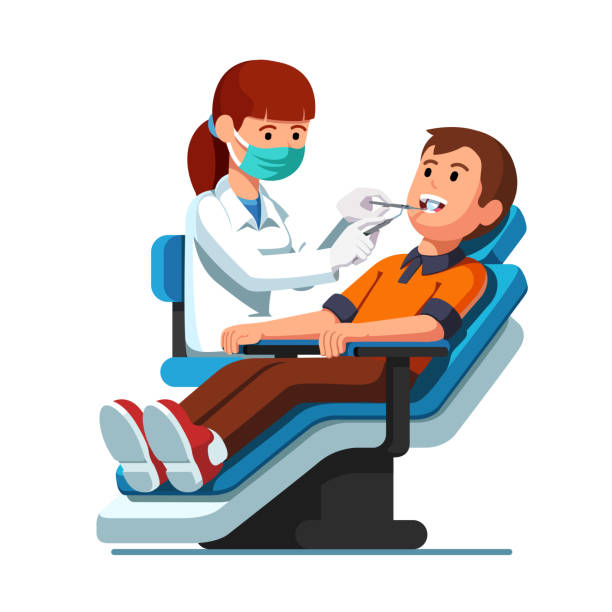What to Expect from Your Initial Visit to a Dentist in Eugene Oregon
What to Expect from Your Initial Visit to a Dentist in Eugene Oregon
Blog Article
A Guide to Typical Oral Conditions That Call for a Dentist's Care
Toothaches, for example, can be symptomatic of serious problems such as cavities, broken teeth, or abscesses, each calling for certain interventions like fillings or root canals. Influenced knowledge teeth and jaw conditions can present significant discomfort and difficulties.
Toothaches
Toothaches are a typical dental problem that can vary from light discomfort to extreme discomfort, commonly showing an underlying problem that needs specialist focus. This discomfort can originate from a range of resources, consisting of tooth decays, cracked or fractured teeth, and oral abscesses. Each of these problems poses substantial dangers if left untreated, possibly resulting in much more severe complications.
Dental tooth cavities, also called cavities, are brought on by the buildup of plaque that wears down tooth enamel, causing holes or pits in the influenced teeth. Cracked or fractured teeth, on the various other hand, might result from trauma, grinding, or biting into hard things. These architectural problems can subject the delicate inner layers of the tooth, creating sharp discomfort and increasing the risk of infection. Abscesses are agonizing infections at the origin of a tooth or between the gum and a tooth, usually arising from serious decay or untreated cavities.
Effective treatment of toothaches includes attending to the root cause. This may consist of dental fillings for dental caries, crowns for cracked teeth, or origin canals and antibiotics for abscesses. Early intervention by a dental specialist can stop more deterioration and ease discomfort, making certain ideal oral health and wellness.
Gum Tissue Condition

The key reason of gum disease is bacterial plaque, a sticky, colorless movie that frequently bases on teeth. Poor dental hygiene, cigarette smoking, hereditary proneness, and particular clinical problems, such as diabetes, can aggravate the danger of developing gum tissue illness. Routine dental exams are vital for early detection and monitoring of this condition.
Therapy for periodontal illness varies from specialist dental cleansing and scaling to advanced procedures like origin planing and gum surgical procedure, depending on the severity. Preserving great oral health practices, consisting of brushing twice daily, flossing, and making use of a disinfectant mouthwash, can considerably reduce the danger of gum tissue condition and advertise healthier gums.
Dental Caries
Cavities, also understood as tooth decays, are a common dental problem defined by the destruction of tooth enamel because of acid-producing bacteria in the mouth. These germs flourish on sugars and starches from food and drinks, creating acids that progressively deteriorate the enamel, bring about tooth cavity formation.
Early-stage cavities may disappoint symptoms, yet as original site they advance, they can trigger tooth pain, sensitivity to hot or cool, visible openings or pits in the teeth, and discoloration. If left untreated, tooth cavities can permeate deeper layers of the tooth, possibly leading to severe discomfort, infection, and even tooth loss.
Protecting against tooth cavities involves a combination of excellent dental health methods and nutritional behaviors. Routine brushing with fluoride toothpaste, flossing, and regular dental check-ups are important. Dental professionals may additionally try this suggest extra safety nets, such as fluoride therapies and dental sealers, to safeguard teeth from decay.
Small tooth cavities can be attended to with oral fillings, which restore the tooth's structure. Much more advanced cases may require crowns or even root canal treatment if the degeneration has actually gotten to the tooth's pulp.
Impacted Knowledge Teeth
Impacted wisdom teeth are a widespread dental problem that occurs when the third molars, commonly referred to as knowledge teeth, stop working to fully emerge or align effectively within the mouth. This problem often results from inadequate space in the jaw or an unusual development angle of the teeth. Affected wisdom teeth can cause a range of problems, including damage, pain, and infection to nearby teeth.
When wisdom teeth come to be impacted, they are typically partly emerged or stay entirely below the gum line. This partial eruption can produce a pathway for germs to go into the periodontals, leading to infections that show up as swelling, pain, and also high temperature (dentist in eugene oregon). Additionally, affected wisdom teeth can put in pressure on surrounding teeth, possibly creating crowding or shifting
A thorough dental examination, generally involving X-rays, is vital for detecting influenced knowledge teeth. Treatment frequently includes medical removal, executed by an oral specialist. The treatment aims to reduce discomfort and avoid more complications, such as cysts or damage to bordering bone frameworks. Post-operative care is essential to ensure appropriate recovery and reduce the threat of infection. Regular dental examinations are a good idea to keep track of the condition and preserve dental health and wellness.
Jaw Problems
Conclusion

Oral cavities, additionally understood as cavities, are created by the build-up of plaque that deteriorates tooth enamel, leading to openings or pits in the influenced teeth. Abscesses are excruciating infections at the root of a tooth or between a tooth and the periodontal, commonly resulting from extreme decay or neglected dental caries.
Affected knowledge teeth are a prevalent dental issue that occurs when the third molars, commonly referred to as knowledge teeth, fail to fully arise or line up appropriately within the mouth. Impacted knowledge teeth can lead to a range of problems, including pain, infection, and damages to surrounding teeth.
Furthermore, affected wisdom teeth can exert stress on neighboring teeth, potentially causing crowding or shifting.
Report this page